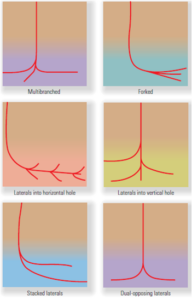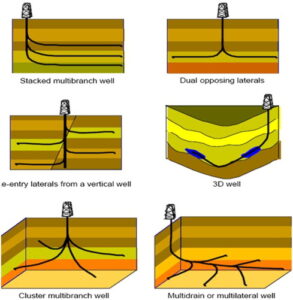OrientMCT
Horizontal, Extended and Multilateral Drilling

The Horizontal, Extended, and Multilateral Drilling course is designed to provide participants with a comprehensive understanding of advanced drilling techniques used to access and exploit hydrocarbon reservoirs more efficiently. This course focuses on horizontal drilling, extended reach drilling, and multilateral drilling, which offer significant benefits in terms of reservoir exposure, production rates, and overall well performance.
Throughout the course, participants will learn about the principles, methods, and equipment used in horizontal drilling. They will understand how horizontal wells are planned, designed, and executed to intersect and follow the reservoir’s productive zones over an extended distance. Participants will explore the various drilling techniques employed, including the use of rotary steerable systems, mud motors, and downhole drilling tools to navigate the wellbore accurately.
The course will cover the benefits and challenges associated with horizontal drilling, including improved reservoir drainage, increased production rates, and reduced water and gas coning. Participants will also learn about the different types of horizontal well completions, such as open-hole completions, cased-hole completions, and multistage hydraulic fracturing, to enhance hydrocarbon recovery.
Participants will gain insights into extended reach drilling, which involves drilling wells with extended lateral sections or high build rates to reach targets that are distant or difficult to access using conventional vertical drilling. They will learn about the specialized techniques, drilling assemblies, and wellbore trajectories employed to achieve extended reach drilling objectives while managing the associated challenges, such as torque and drag, hole cleaning, and wellbore stability.
The course will also cover multilateral drilling, which involves drilling multiple lateral branches from a single main wellbore to access and drain multiple reservoir compartments. Participants will understand the benefits, design considerations, and completion methods associated with multilateral wells, including junction design, sand control techniques, and isolation mechanisms between the branches.
Safety considerations and wellbore integrity are crucial in advanced drilling techniques, and the course will emphasize the importance of risk assessment, contingency planning, and well control practices specific to horizontal, extended, and multilateral drilling operations.

By the end of the Horizontal, Extended, and Multilateral Drilling course, participants will have a solid understanding of the principles, methods, and challenges associated with these advanced drilling techniques. They will be equipped with the knowledge to plan, design, and execute horizontal, extended reach, and multilateral drilling projects effectively. This course is valuable for drilling engineers, well planners, and professionals involved in well construction who seek to enhance their expertise in these advanced drilling techniques.
Get In Touch!
Contact us for a quote or in case of any urgent queries please send us an email on: [email protected]
we will get back to you right away!